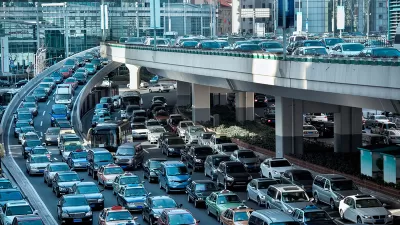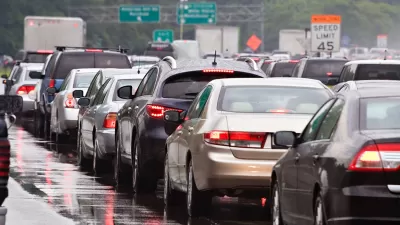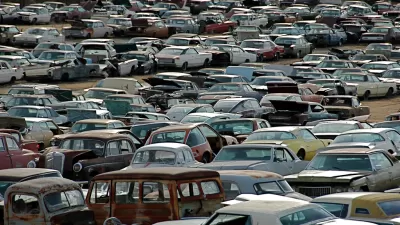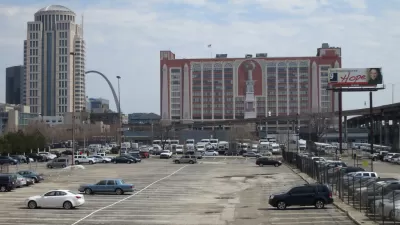Vehicle Miles Traveled

Has Alternative Transportation Received Too Much Attention?
Joseph Stomberg of Vox has initiated a series of articles on commuting in America, the first based on the issues explaining the domination of the auto, the second on the debate about the driving decline associated with millennials.
Revised Data Shows Vehicle Miles Traveled Increased in 2013
Peak VMT reportedly occurred in 2007, but that may not stand long according to updated DOT estimates of 2013 travel. According to the data, Americans drove nearly three trillion miles. Another finding is the large increase in number of vehicles.
The Far-Reaching, Lasting Effects of Low Oil Prices
With SUV sales up, car sales down, and mileage driven up, the effects of lower gas prices could soon extend to land use, making suburban and exurban commuting more affordable. Economists have a term for these effects: demand response.
Will Plummeting Gas Prices Threaten Recent Transit Ridership Gains?
As gas prices have fallen, driving has increased. October driving mileage figures show an increase of 3 percent from a year earlier. A shift away from public transit may cause transit providers to rethink expansion plans.

Peak Driving Record Shattered
So long 2007. Hello 2014. According to new DOT data, peak driving is no longer in the rear view mirror but ahead of us thanks to cheap gas getting even cheaper, the rebound effect, an improved economy, and warmer weather.
State-Level Data Reveals Earlier Peak Driving than Previously Thought
With implications on the narrative of peak driving and on the economic forces that drive the country, a new study reveals that some statewide populations began driving less as early as 1992.
Does Peak Car Mean the End of Induced Demand?
Aaron Renn provides a dissenting argument on the implications of peak car, namely, "if we’ve really reached peak car, maybe we really can build our way out of congestion after all."
Pasadena Ditches 'Level of Service' Review for Multi-Modal Measurements
Pasadena got out in front of the state of California this week by replacing "level of service" with a more holistic, less car-centric, set of standards for review under the California Environmental Quality Act.
Staying Vigilant on Level of Service Reform
The Natural Resources Defense Council's (NRDC) Switchboard blog chimes in on the potential benefits of California's ongoing reform of Level of Service (LOS) review.

Federal Highway Administration Reports Increasing Vehicle Miles Traveled
The FHWA reports that Americans have returned to the road en masse this summer—beware obvious political motivations and a failure to compare VMT trends to population growth.

Five Reasons Why Peak Driving is Here to Stay
The Great Recession ended in the summer of 2009. Unemployment has fallen and consumer spending has risen, as have most economic metrics save one: vehicle miles traveled. There is a list of reasons why VMT hasn't risen, and perhaps won't.
California Cuts 'Level of Service' from CEQA Requirements
The State of California has shifted from measuring "Level of Service," a grade based on how many cars pass through an intersection in a given time, to assessing overall Vehicle Miles Traveled (VMT) in its Environmental Quality laws.
Recent Data Show Americans Continuing to Kick the Driving Habit
Fresh data from the Federal Highway Commission details the amount of travel by American's on roads and highways through March 2013. When adjusted for population growth, a conclusion for a new age emerges: the driving boom is over.

Lacking a Coherent Urban Planning Vision? 'Build More Roads' Will Have to Do
A recent article addresses the illogical planning agenda set by states (Missouri, in this case) because local governments (St. Louis, in this case) lack a coherent planning vision. The situation is surely not unique in the annals of planning.
Peak Sprawl Happened—20 Years Ago
Analysis of the USDA’s 2010 National Resources Inventory, which tracks land use, shows the growth rate of suburban sprawl peaking in the mid-1990s, declining by two-thirds since then, even through the most recent housing boom. How did that happen?
The Road to Prosperity: Real-Time Approaches to Economic Improvement
People have been driving about 1% less per year for the last 9 years. What can public-private partnerships for transportation alternatives do to stoke this fire?
Driving Continues to Decline in U.S.
Federal data released last week shows that for the eighth straight year, per capita vehicle-miles traveled (VMT) has declined in the United States.
Mileage Tax the Newest Attempt at Addressing Traffic Concerns
Eric Jaffe reports that taxing vehicle-miles traveled (VMT) is getting a closer look in cities across America. But will concerns over privacy and government competence scuttle a promising path to reducing congestion and increasing revenue?
Has Increased Urbanism Initiated A Decline In American Driving?
Eric Jaffe discusses new charts released last week that purport to show the continued decline of vehicle-miles traveled in the United States, and wonders if increased urbanism can be credited as the cause.
The Appeal of In-Town Big Box
Emily Badger recounts the litany of gripes about Big Box stores, then proceeds to present the results of a recent study that shows why they may not be so bad after all.
Pagination
Urban Design for Planners 1: Software Tools
This six-course series explores essential urban design concepts using open source software and equips planners with the tools they need to participate fully in the urban design process.
Planning for Universal Design
Learn the tools for implementing Universal Design in planning regulations.
Smith Gee Studio
City of Charlotte
City of Camden Redevelopment Agency
City of Astoria
Transportation Research & Education Center (TREC) at Portland State University
US High Speed Rail Association
City of Camden Redevelopment Agency
Municipality of Princeton (NJ)


































